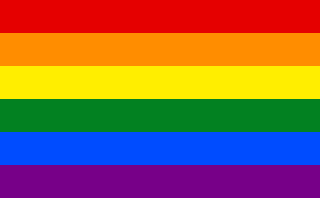Gender dysphoria (GD) is the distress a person experiences due to a mismatch between their gender identity—their personal sense of their own gender—and their sex assigned at birth. The term replaced the previous diagnostic label of gender identity disorder (GID) in 2013 with the release of the diagnostic manual DSM-5. The condition was renamed to remove the stigma associated with the term disorder.

LGBT is an initialism that stands for "lesbian, gay, bisexual, and transgender". It may refer to anyone who is non-heterosexual, non-heteroromantic, or non-cisgender, instead of exclusively to people who are lesbian, gay, bisexual, or transgender. A variant, LGBTQ, adds the letter Q for those who identify as queer or are questioning their sexual or gender identity. Another variation, LGBTQ+, adds a plus sign "represents those who are part of the community, but for whom LGBTQ does not accurately capture or reflect their identity". Many further variations of the acronym exist, such as LGBT+, LGBTQIA+, and 2SLGBTQ+. The LGBT label is not universally agreed to by everyone that it is generally intended to include. The variations GLBT and GLBTQ rearrange the letters in the acronym. In use since the late 1980s, the initialism, as well as some of its common variants, functions as an umbrella term for marginalized sexualities and gender identities.

The LGBT community is a loosely defined grouping of lesbian, gay, bisexual, and transgender individuals united by a common culture and social movements. These communities generally celebrate pride, diversity, individuality, and sexuality. LGBT activists and sociologists see LGBT community-building as a counterweight to heterosexism, homophobia, biphobia, transphobia, sexualism, and conformist pressures that exist in the larger society. The term pride or sometimes gay pride expresses the LGBT community's identity and collective strength; pride parades provide both a prime example of the use and a demonstration of the general meaning of the term. The LGBT community is diverse in political affiliation. Not all people who are lesbian, gay, bisexual, or transgender consider themselves part of the LGBT community.
Femme is a term traditionally used to describe a lesbian woman who exhibits a feminine identity or gender presentation. While commonly viewed as a lesbian term, alternate meanings of the word also exist with some non-lesbian individuals using the word, notably some gay men, bisexuals, non-binary, and transgender individuals.

The field of psychology has extensively studied homosexuality as a human sexual orientation. The American Psychiatric Association listed homosexuality in the DSM-I in 1952, but that classification came under scrutiny in research funded by the National Institute of Mental Health. That research and subsequent studies consistently failed to produce any empirical or scientific basis for regarding homosexuality as anything other than a natural and normal sexual orientation that is a healthy and positive expression of human sexuality. As a result of this scientific research, the American Psychiatric Association removed homosexuality from the DSM-II in 1973. Upon a thorough review of the scientific data, the American Psychological Association followed in 1975 and also called on all mental health professionals to take the lead in "removing the stigma of mental illness that has long been associated" with homosexuality. In 1993, the National Association of Social Workers adopted the same position as the American Psychiatric Association and the American Psychological Association, in recognition of scientific evidence. The World Health Organization, which listed homosexuality in the ICD-9 in 1977, removed homosexuality from the ICD-10 which was endorsed by the 43rd World Health Assembly on 17 May 1990.

A trans man is a man who was assigned female at birth. Trans men have a male gender identity, and many trans men undergo medical and social transition to alter their appearance in a way that aligns with their gender identity or alleviates gender dysphoria.

LGBT culture is a culture shared by lesbian, gay, bisexual, transgender, and queer individuals. It is sometimes referred to as queer culture, while the term gay culture may be used to mean either "LGBT culture" or homosexual culture specifically.
Gender variance or gender nonconformity is behavior or gender expression by an individual that does not match masculine or feminine gender norms. A gender-nonconforming person may be variant in their gender identity, being transgender or non-binary, or they may be cisgender. In the case of transgender people, they may be perceived, or perceive themselves as, gender-nonconforming before transitioning, but might not be perceived as such after transitioning. Transgender adults who appear gender-nonconforming after transition are more likely to experience discrimination.

Bisexual erasure, also called bisexual invisibility, is the tendency to ignore, remove, falsify, or re-explain evidence of bisexuality in history, academia, the news media, and other primary sources.

Same-sex parenting is the parenting of children by same-sex couples generally consisting of gays or lesbians who are often in civil partnerships, domestic partnerships, civil unions, or same-sex marriages.

The questioning of one's sexual orientation, sexual identity, gender, or all three is a process of exploration by people who may be unsure, still exploring, or concerned about applying a social label to themselves for various reasons. The letter "Q" is sometimes added to the end of the acronym LGBT ; the "Q" can refer to either queer or questioning.
Gay affirmative psychotherapy is a form of psychotherapy for non-heterosexual people, specifically gay and lesbian clients, which focuses on client comfort in working towards authenticity and self-acceptance regarding sexual orientation, and does not attempt to "change" them to heterosexual, or to "eliminate or diminish" same-sex "desires and behaviors". The American Psychological Association (APA) offers guidelines and materials for gay affirmative psychotherapy. Affirmative psychotherapy affirms that homosexuality or bisexuality is not a mental disorder, in accordance with global scientific consensus. In fact, embracing and affirming gay identity can be a key component to recovery from other mental illnesses or substance abuse. Clients whose religious beliefs are interpreted as teaching against homosexual behavior may require some other method of integration of their possibly conflicting religious and sexual selves.
Kenneth J. Zucker is an American-Canadian psychologist and sexologist. He was named editor-in-chief of Archives of Sexual Behavior in 2001. He was psychologist-in-chief at Toronto's Centre for Addiction and Mental Health (CAMH) and head of its Gender Identity Service until December 2015. Zucker is a professor in the departments of psychiatry and psychology at the University of Toronto.
Various topics in medicine relate particularly to the health of lesbian, gay, bisexual, transgender, queer, intersex and asexual (LGBTQIA) individuals as well as other sexual and gender minorities. According to the US National LGBTQIA+ Health Education Center, these areas include sexual and reproductive health, mental health, substance use disorders, HIV/AIDS, HIV-related cancers, intimate partner violence, issues surrounding marriage and family recognition, breast and cervical cancer, inequities in healthcare and access to care. In medicine, various nomenclature, including variants of the acronym LGBTQIA+, are used as an umbrella term to refer to individuals who are non-heterosexual, non-heteroromantic, or non-cis gendered. Specific groups within this community have their own distinct health concerns, however are often grouped together in research and discussions. This is primarily because these sexual and gender minorities groups share the effects of stigmatization based on their gender identity or expression, and/or sexual orientation or affection orientation. Furthermore, there are subpopulations among LGBTQIA+ groups based on factors such as race, ethnicity, socioeconomic status, geographic location, and age, all of which can impact healthcare outcomes.
Research has found that attempted suicide rates and suicidal ideation among lesbian, gay, bisexual, and transgender (LGBT) youth are significantly higher than among the general population.
Minority stress describes high levels of stress faced by members of stigmatized minority groups. It may be caused by a number of factors, including poor social support and low socioeconomic status; well understood causes of minority stress are interpersonal prejudice and discrimination. Indeed, numerous scientific studies have shown that when minority individuals experience a high degree of prejudice, this can cause stress responses that accrue over time, eventually leading to poor mental and physical health. Minority stress theory summarizes these scientific studies to explain how difficult social situations lead to chronic stress and poor health among minority individuals.

LGBT ageing addresses issues and concerns related to the ageing of lesbian, gay, bisexual and transgender (LGBT) people. Older LGBT people are marginalised by: a) younger LGBT people, because of ageism; and b) by older age social networks because of homophobia, biphobia, transphobia, heteronormativity, heterosexism, prejudice and discrimination towards LGBT people.
LGBT psychology is a field of psychology of surrounding the lives of LGBTQ+ individuals, in the particular the diverse range of psychological perspectives and experiences of these individuals. It covers different aspects such as identity development including the coming out process, parenting and family practices and support for LGBTQ+ individuals, as well as issues of prejudice and discrimination involving the LGBT community.
Due to the increased vulnerability that lesbian, gay, bisexual, and transgender (LGBT) youth face compared to their non-LGBT peers, there are notable differences in the mental and physical health risks tied to the social interactions of LGBT youth compared to the social interactions of heterosexual youth. Youth of the LGBT community experience greater encounters with not only health risks, but also violence and bullying, due to their sexual orientation, self-identification, and lack of support from institutions in society.
Many health organizations around the world have denounced and criticized sexual orientation and gender identity change efforts. National health organizations in the United States have announced that there has been no scientific demonstration of conversion therapy's efficacy in the last forty years. They find that conversion therapy is ineffective, risky and can be harmful. Anecdotal claims of cures are counterbalanced by assertions of harm, and the American Psychiatric Association, for example, cautions ethical practitioners under the Hippocratic oath to do no harm and to refrain from attempts at conversion therapy.






